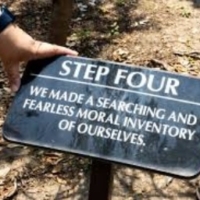
When we come to the point of making amends, fear can overwhelm us as we think about facing those we have harmed. When we caused them harm, we were enemies of God and serving a different master. We have now been reconciled to God and are willing to admit the error of our former ways. God has forgiven us for the wrongs we have done and now we need to ask forgiveness of those we have harmed and, if possible, work towards reconciliation.
At one time you were separated from God. You were his enemies in your minds, because the evil you did was against him. But now he has made you his friends again. He did this by the death Christ suffered while he was in his body. He did it so that he could present you to himself as people who are holy, blameless, and without anything that would make you guilty before him. (Colossians 1:21-22 ERV)

When we are reconciled to God, we have the power of the Holy Spirit in us strengthening us to do what we need to do. God cares about the people we have harmed. Some of our relationships may no longer exist but we need to be willing to make amends for the harm we have caused, except when doing so would further injure the person we harmed or others. We need to pray and seek advice from God, our sponsor, or another trusted friend, as to how we can properly make our amends.
Let no debt remain outstanding, except the continuing debt to love one another, for whoever loves others has fulfilled the law. (Romans 13:8 NIV)

Though we may dread doing the work of reconciliation, in the end it will give us peace in our hearts. Hopefully the people we have harmed will offer us forgiveness, but if they choose not to, that choice remains with them. When we make our amends as God requires of us, then we can leave the outcome of our obedience with Him.
Prayer: Heavenly Father, As I seek to do the work of making amends with those I have harmed, I ask for the courage to do all that needs to be done. Help me to have love for those I have injured and with my amends truly desire what is best for them. Amen
Audio for TAKING CARE AS WE MAKE AMENDS
Recent Meditations
Giving Hope
Partners in Hope is supported wholly by our friends and community. We are thankful to everyone who partners with us to help bring hope to the discouraged, hurting, and hopeless.




